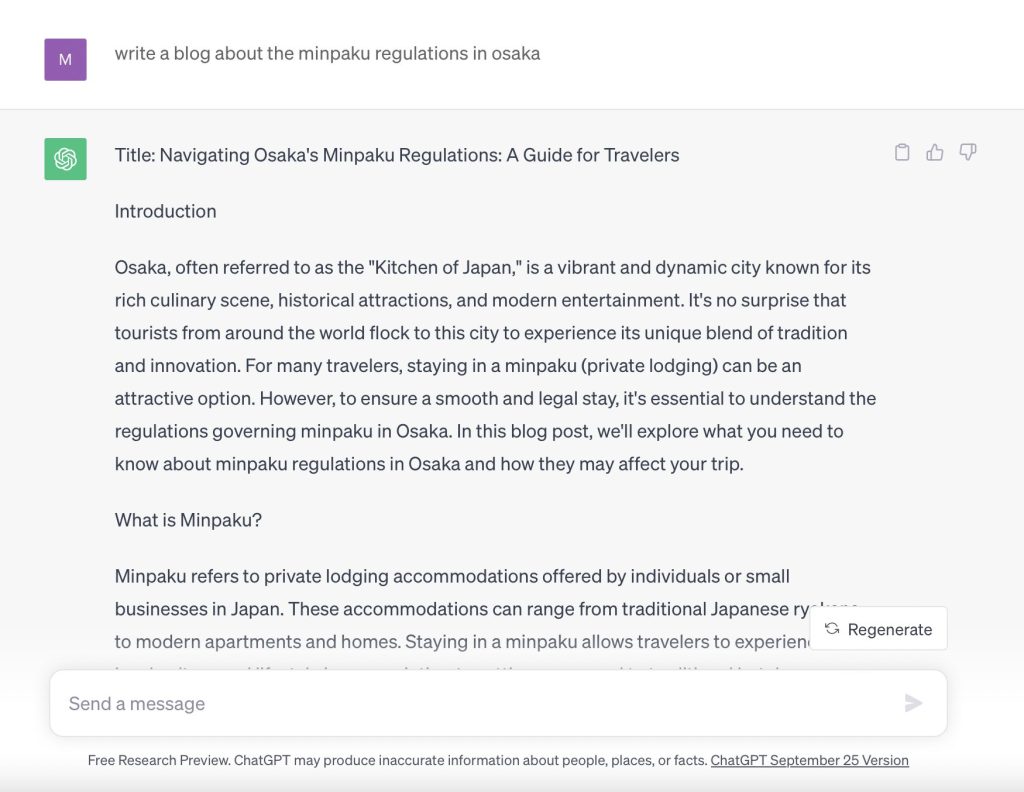
Osaka, often referred to as the “Kitchen of Japan,” is a vibrant and dynamic city known for its rich culinary scene, historical attractions, and modern entertainment. It’s no surprise that tourists from around the world flock to this city to experience its unique blend of tradition and innovation. For many travelers, staying in a minpaku (private lodging) can be an attractive option. However, to ensure a smooth and legal stay, it’s essential to understand the regulations governing minpaku in Osaka. In this blog post, we’ll explore what you need to know about minpaku regulations in Osaka and how they may affect your trip.
What is Minpaku?
Minpaku refers to private lodging accommodations offered by individuals or small businesses in Japan. These accommodations can range from traditional Japanese ryokans to modern apartments and homes. Staying in a minpaku allows travelers to experience the local culture and lifestyle in a more intimate setting compared to traditional hotels.
Minpaku Regulations in Osaka
- Licensing and Registration
To operate a minpaku in Osaka legally, hosts must obtain the necessary licenses and register their property with the local government. The licensing process involves meeting specific safety and hygiene standards, which are in place to protect both hosts and guests. Be sure to confirm that your chosen minpaku is properly registered to avoid any legal issues during your stay.
- Location Restrictions
Osaka, like many other Japanese cities, enforces location-based regulations on minpaku. Some areas may have restrictions on the number of minpaku accommodations allowed in a given neighborhood, and others may prohibit minpaku altogether. Before booking, check the property’s location to ensure it complies with local regulations.
- Host Responsibilities
Minpaku hosts in Osaka are required to provide certain amenities and services to their guests, such as clean bedding, towels, and information about the local area. Additionally, hosts are expected to maintain the property in good condition and promptly address any issues or complaints from guests.
- Guest Registration
When staying at a minpaku in Osaka, guests are required to provide their passport information to the host. The host must then report this information to the local government, as part of Japan’s efforts to track guest movements for security purposes.
- Noise and Behavior
Minpaku guests are expected to be respectful of their neighbors and adhere to the local noise regulations. Osaka, like other Japanese cities, values tranquility, and guests should be mindful of noise levels, especially during late hours.
Benefits of Choosing a Minpaku
While navigating the regulations might seem daunting, staying in a minpaku offers several advantages for travelers:
- Immersive Experience: Minpaku accommodations often provide a more authentic and immersive cultural experience compared to standard hotels.
- Cost-Effective: Minpaku options can be more budget-friendly, particularly for larger groups or extended stays.
- Local Insights: Hosts can offer valuable local insights, tips, and recommendations to enhance your visit.
- Privacy and Comfort: Enjoy the privacy and comfort of a home-like environment, with amenities like kitchens and living spaces.
Conclusion
Osaka’s minpaku regulations are in place to ensure the safety and quality of accommodations for travelers while respecting the needs and concerns of local communities. By understanding and adhering to these regulations, you can enjoy a memorable and legally compliant stay in Osaka. Remember to check the registration status of your chosen minpaku, research its location, and be a responsible guest to make the most of your time in this vibrant city. Osaka’s unique blend of tradition and modernity is waiting for you to explore, and staying in a minpaku can be an excellent way to do just that.

For additional information or any questions please contact us here
Email: info@remax-apex.com

